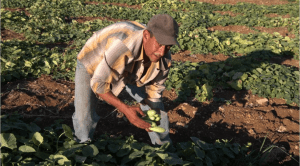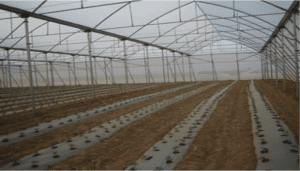Aisha Mansour is co-founder of Sharaka-Community Supported Agriculture. Sharaka is a volunteer run initiative working towards food sovereignty in Palestine. Sharaka activities include a seasonal farmers market, school garden program, education and awareness, and an underground seasonal restaurant called, Majhoul. In her free time, Aisha experiments with seasonal food production in an effort to achieve self-sufficiency, and she blogs at Seasonal Palestinian.
One of the main principles that guides international development is “Do No Harm.” A bright-eyed, enthusiastic development specialist in Palestine may think agricultural interventions are doing no harm. But does a longer-term, broader view of the situation, from a local’s perspective, see donor intervention as benign?
Although the Palestinian agricultural sector receives less than 1% of the “aid” funding that comes into Palestine, the total amount is still significant. Between 2006-2011, over $658 million USD was injected into the Palestinian agricultural sector through over 22,000 interventions, according to the Agricultural Project Information System. Most of the funds are allocated towards capacity building, plant production, livestock production, and water resources. Sounds great, right? When I asked the Ministry of Agriculture (MoA) for a summary of the projects, I received a long list organized by project title, donor, and total dollar amount. The MoA does not conduct regular assessments of the interventions and their impact. But a few interviews with locally-based donors and recipients showed me that the general purpose of donor interventions was to transform Palestinian agriculture into a cog in the overall global economy.
Capacity building efforts focus on teaching farmers to follow international standards such as Global Gap that regulate the types of plants that may be grown, and methods for use of chemical pesticide and fertilizer. Plant and animal production efforts concentrate on the use of foreign inputs that meet international standards and industrialize Palestinian agriculture, ensuring a ready supply of food for the global market. Farmers are taught to produce cash crops that will provide them a higher income. Cash crops are items that are in demand by the Western and global market and include products such as cherry tomatoes and majdool dates. The traditional Palestinian farmer who once produced seasonal varieties of vegetables, fruits, and grains using environmentally friendly techniques for the local market is being transformed into a modernized agribusiness using foreign seeds and chemical pesticides and fertilizers to produce one or two items that are in high demand in foreign markets.
Donors have decided to address Palestinian food insecurity by improving the income of farmers so that they can purchase food for their families from the local market. Meanwhile, most of the foods on the local market, as a result of the imposed free trade policies, are cheap imports from the West. In other words, this new system of modernized food production is usurping the traditional mode of seasonal and varietal food production using local heirloom seeds and zero chemicals to feed the local population. Isn’t that doing harm? Yes! The negative impacts of the donor interventions are numerous and include the following:
- Reducing the human capabilities of the Palestinian farmer/peasant: The traditional Palestinian farmer was highly independent with regard to food production and methods for selling the end product on the local market. Today’s modernized farmer has been transformed into a wage worker punching his card at the agribusiness. The modernized farmer does not choose what to grow, nor possess any leverage on the marketing of the product. Items produced are based on Western demand and sales prices are fixed by the global economy.
- Increasing food insecurity among Palestinians: Linking the Palestinian economy to the global economy has not reduced food insecurity among Palestinian farmers. Traditionally, Palestinian farmers never experienced food insecurity. A variety of food staples were produced for the household and other items were obtained through barter and exchange. However, the free trade policies imposed on the Palestinians by the donor community have tied local food prices to the global market, making ‘good’ food too expensive and inaccessible to the poor.
- Institutionalizing market linkages and dependence on Israel: Donor interventions in Palestinian agriculture have also forced a stronger attachment to the Israeli economy, despite the fact that Palestinians are trying to achieve independence in their homeland. Donor interventions support Palestinian farmers to produce for export. But in Occupied Palestine, the only way to export is through Israel, or through an “intermediary” that, of course, must go through Israel. Further, the required inputs as outlined by international standards systems such as Global Gap are all acquired through Israel.
- Environmental destruction: The attention to the production of a few select cash crops, many of them being genetically modified, means that we have lost the bounty within Palestine. Prior to the Oslo-period donor interventions, Palestinian agricultural production consisted of varieties of heirloom vegetables and fruits. This rich biodiversity has been lost as the donor interventions have introduced a few genetically modified seeds. These manufactured seeds require the use of chemical pesticides and fertilizers that weaken the soil, and render it less productive. Further, our diet has become bland and boring as we consume the same four or five vegetables all year long, which negatively impacts our health, and so the downward spiral persists.
- Food assistance instead of food sovereignty: The donor community does not seem able to grasp the connection. And so agricultural interventions remain isolated from food assistance. International agricultural experts work within the Palestinian agricultural sector to support farmers to increase their incomes and decrease their vulnerability to food insecurity, while the international humanitarian relief folks are busy collecting leftovers from the West to feed the hungry and needy in the South, including Palestine. Nowhere in this multi-million dollar industry do the two meet to bridge agriculture and food assistance to develop a sustainable food sovereign system within the recipient country. Or perhaps that is not the aim of the game?
- Northern Occupation of Palestinian land: It’s not enough that Israel keeps grabbing Palestinian land and natural resources. Now the West would like the small bit of land remaining under Palestinian cultivation to feed the rest of the Northern world. This land grab has meant that less and less food produced in Palestine feeds Palestinians, while more and more of the second-rate processed products are dumped in the Palestinian market.
- Accept Israel as status quo: And finally, all of these projects that are meant to support the Palestinian farmers work around and within the Israeli Occupation. Aid interventions ignore the impact of the Occupation, and Israel’s illegal practices of land grabbing and stealing natural resources. Instead, donor projects focus on increasing the income of farmers within the existing Occupation, without challenging the essence of the Israeli Occupation. It is important to note that Palestinian agriculture flourished prior to the Israeli Occupation of 1948 and 1967. Prior to the Occupation, Palestinians produced abundantly and fed the local market, and exported the excess to the Arab world.
Fortunately, the traditional small-scale Palestinian farmer still exists, however, in diminishing numbers. These farmers continue to produce healthy, baladi (local) food for their communities. But they struggle to survive in this aggressive environment. Palestinians are becoming aware and rising against this hijacking of their food system. Local foodies, activists, peasants and farmers are organizing to develop alternatives to the imposed global and modernized food system that has been forced on them. Palestinian interventions include local women serving a healthy lunch at a school, door-to-door local produce delivery, a traditional culinary school, and a farmers market. It is time to be honest with ourselves and take responsibility for what is happening in our country. Donor interventions and imposed policies that are harmful must be stopped. Alternatives to development must be sought from within.


Great article. This is happening (omit the Israeli occupation) all over the world. Food grown ‘out of season’ for cash is not a good thing. Ingesting food grown out of season is not a good thing.
Great rich piece Aisha. Thanks and Congratulations.
I am interested about our agricultural ministry’s reply on this.
In fact we need our own indigenous policy, a real Palestinian one.
While reading I imagined a presentation to be hold at several target groups, like big farmers, food industry, .. And develop with them a midway to transform the situation…
Thanks Wael for your comments. The MoA has developed a strategy that focuses on the needs of Palestinian agriculture, including increasing production and supporting infrastructure, and building capacity. However, the devil is in the details. The donor community, through their interventions, may seem to meet such national objectives, but in fact they are undermining them. There has not been any real effort on reviewing these interventions and evaluating their outcomes and impact in our country. You are right – we need a strong national policy,ane we need our national stakeholders to be aware, involved, and drive the direction of the interventions.